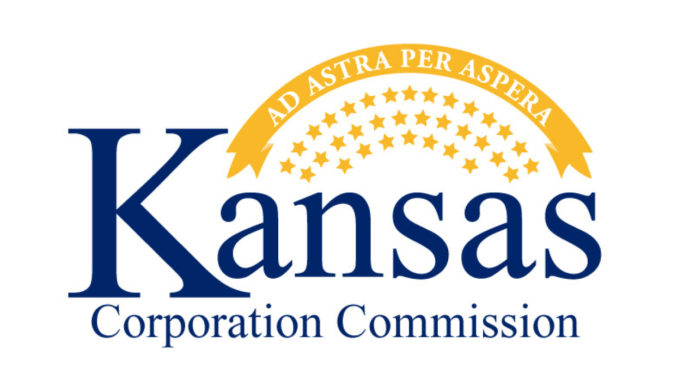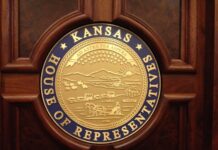State utility regulators on Tuesday came out against a proposal intended to limit power companies’ from recovering electric transmission costs from consumers and saving ratepayers money.
Originally planning to testify as neutral on the bill, a top regulator at the Kansas Corporation Commission testified against the legislation in the face of current events that have led to rolling electric blackouts amid subzero temperatures.
Justin Grady, of the KCC’s utilities division, expressed reservations about the bill, which would limit utility companies from increasing or decreasing the surcharge for electric transmission delivery that appears on a customer’s bill.
Currently, a utility company can modify the charge — $14 on a $114 monthly bill from Evergy, for instance — whenever a utility’s proposed change in transmission costs is approved by the Federal Energy Regulatory Commission.
Supporters said the legislation would stop power companies from annually adjusting the transmission rate, making the utility wait for a general rate case proceeding, which generally comes up every three to five years.
It’s the latest bill that has been debated in the Legislature that has sought to push down electric rates in Kansas, something that Evergy told lawmakers it’s working toward although this legislation wasn’t the solution.
Grady — the KCC’s chief of revenue requirements, cost of service and finance — said the legislation might be ill-timed, not knowing the fallout from the rolling electric blackouts imposed to manage power during the deep freeze gripping the state.
Grady said there could be ensuing investigations that lead to changes in energy policy in Kansas, regionally and nationally.
Those changes could include calls for a more diverse energy portfolio and strengthening the transmission grid in Kansas and throughout the region, as well as more regional development of power transmission.
“With that much uncertainty on the policy landscape, the KCC’s staff’s position at this point is that to change the transmission delivery charge bill in this fashion, focusing so singulary on the issue of economics and bill stability for maybe another couple of years, we think that would be shortsighted at this point,” Grady said.
Darrin Ives, Evergy’s vice president of regulatory affairs, said there were several reasons why the legislation “makes no sense” for utility customers.
This bill, Ives said, would prevent Evergy from immediately passing on any savings from decreases in the transmission charge until the next rate case.
He said five of the last six adjustments in the transmission charge have resulted in decreased rates.
“At a time when Evergy is in a five-year base rate case moratorium, customers would not reap the benefits of quickly passing those savings on,” he said in written testimony.
Ives predicted the bill would only end up costing utility customers more.
“This bill would also result in more rate cases to recover any (transmission development charge) increases or pass along savings from decreases,” he said.
“The financial cost of these additional rate case proceedings will be passed on to Kansas customers,” he said.
The KCC’s Grady agreed with the utility company’s asssessment.
“General rate cases are expensive and time consuming, so it would not be ideal for this
to be Evergy’s only outlet to recover transmission costs outside their control,” Grady said in his written testimony.
“Staff believes it is in the public interest to avoid a base rate case because of costs that are uncontrollable to the utility.”
The legislation was backed by the Kansas Industrial Consumers Group, which is made up of a number of large companies including Cargill, Spirit AeroSystems and Goodyear Tire.
The industrial consumers group said the Federal Energy Regulatory Commission, which oversees interstate electric transmission, allows for utility companies to collect “significantly higher returns” for transmission costs than state regulators.
“These unnecessarily generous returns, paired with quick and easy recovery of costs
through a shareholder-friendly surcharge, have induced our utilities to aggressively invest
in transmission projects, driving substantial rate increases for Kansas customers,” Kansas Industrial Consumers Group lawyer Robert Vincent told lawmakers last week.
The bill, he said, “aims to moderate, but not eliminate, the financial incentives to invest in
transmission projects.”
The federal government has exclusive authority over transmission costs and the amount of money the utility companies can recover.
“As the Legislature looks at ways to make Kansas electric rates more competitive and
affordable, (the bill) is a reasonable and straightforward solution that can help
achieve that goal,” Vincent said.
Some lawmakers weren’t persuaded, however, questioning whether the bill would raise rates, not decrease them.
“This is not making any sense to me if we go forward with this bill,” said Democratic state Rep. Annie Kuether, alluding to Evergy’s testimony that the bill would require more rate cases.
“To me, it’s defeating the purpose of what they’re trying to do,” she said.
Ives said that’s why Evergy opposed the bill.
“We are all for looking for continued solutions” for electric rates, Ives told the House Utilities Committee on Tuesday.
“But we don’t think this is the right one. We think it will be a step backward.”















